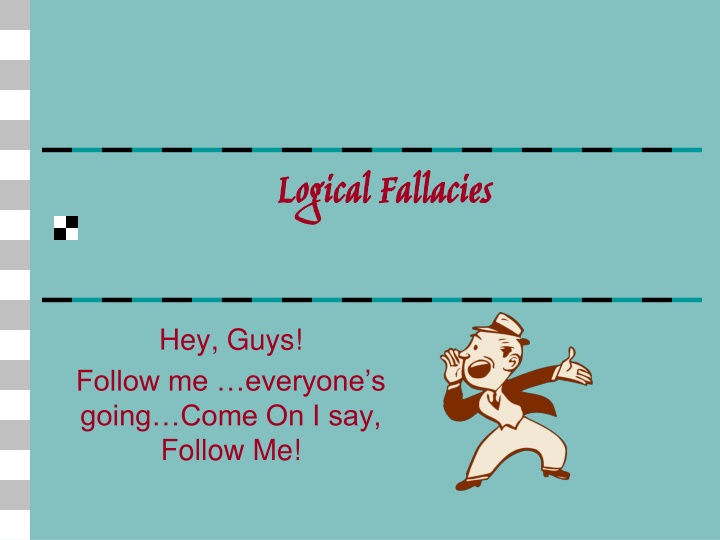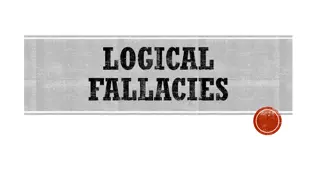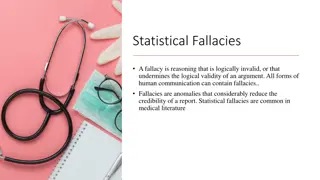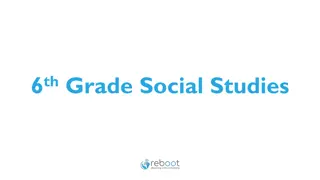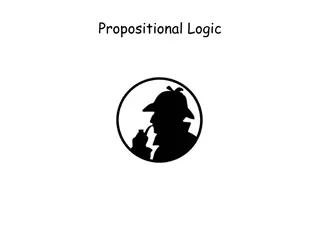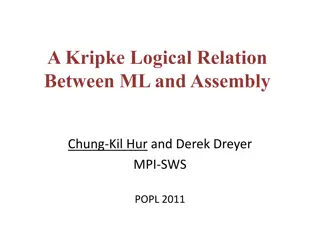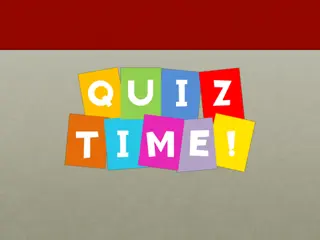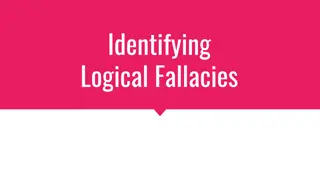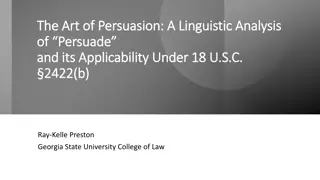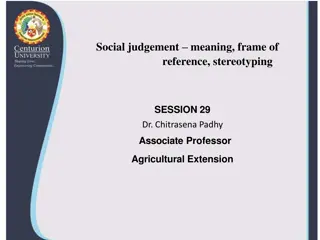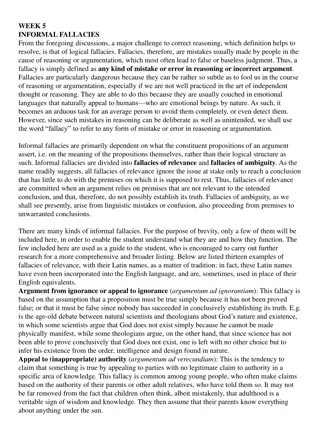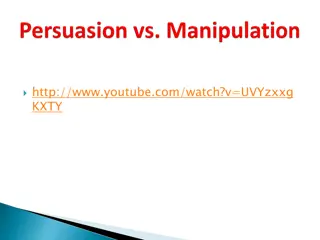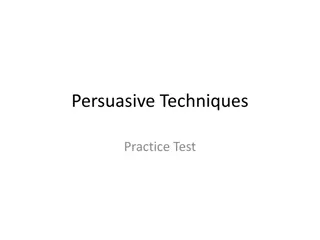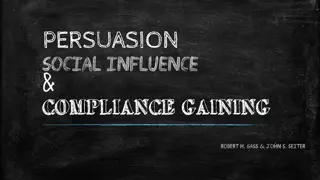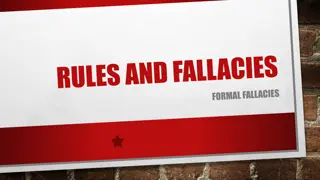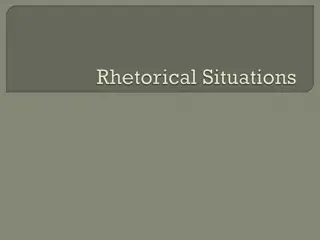Logical Fallacies and Persuasion Techniques
Learn about logical fallacies, persuasive writing, propaganda, and types of fallacies with examples like circular reasoning and false causality. Recognize how persuasive texts aim to influence readers and the importance of critical thinking when encountering different argumentative strategies.
Download Presentation

Please find below an Image/Link to download the presentation.
The content on the website is provided AS IS for your information and personal use only. It may not be sold, licensed, or shared on other websites without obtaining consent from the author.If you encounter any issues during the download, it is possible that the publisher has removed the file from their server.
You are allowed to download the files provided on this website for personal or commercial use, subject to the condition that they are used lawfully. All files are the property of their respective owners.
The content on the website is provided AS IS for your information and personal use only. It may not be sold, licensed, or shared on other websites without obtaining consent from the author.
E N D
Presentation Transcript
Logical Fallacies Logical Fallacies Hey, Guys! Follow me everyone s going Come On I say, Follow Me!
Persuasive text attempts to convince or influence readers! To persuade means to try to influence or convince. In persuasive writing, the author attempts to influence readers of something. Persuasion is when the author expresses an opinion and supports it with details that are meant to convince the reader.
Persuasive Texts Central Argument The central argument is the main opinion that is developed. The intention of the argument is to convince the reader to act or believe according to the judgment or feeling of another person/group.
Propaganda Definition: information, especially of a biased or misleading nature, used to promote or publicize a particular political cause or point of view. Propaganda is a form of persuasion.
Fallacies Fallacious reasoning is a method of presenting information that deceives or confuses the reader. Fallacies are often used in persuasive texts, including propaganda
Types of Logical Fallacies 1. 2. 3. 4. 5. 6. 7. 8. 9. 10. Overstatement 11. Understatement Circular Reasoning (Begging the Question) False Causality Hasty Generalizations Either/Or Oversimplification False Analogy Name Calling Sweeping Generalization Red Herring (Irrelevant Conclusion)
Circular Reasoning (a.k.a. Begging the Question) Circular reasoning is an element of argument used to prove another element of the same argument. It may seem that the author is supporting the argument, when in fact it is not being supported by outside detail, but by the argument itself. Look for the conclusion within the premise of the argument. Example: In a democracy the people are free because democracies are free countries.
False Causality A cause and effect argument with a false cause. Example: Every time I forget my umbrella, it rains. Therefore, I cause the rain by leaving my umbrella at home, and guarantee a nice day by bringing my umbrella. Forgetting my umbrella rain
Hasty Generalizations A hasty generalization presents a general rule based on a too few or atypical examples. Examples: I saw 12 boys wearing Vans at the homecoming dance Saturday night so all boys must wear Vans. Stereotype is similar, but based on gender, ethnicity, race, political, social, professional, or religious group.
Either/Or Simply implies that there are only two alternatives. Example: Would you rather have a senator who is handsome and dumb or one who is ugly and intelligent? You are either for or against the law. Decide!
Over Simplification The author s argument attempts to suggest that a complex issue is uncomplicated. Example: I am so tired of hearing about illegal immigration. Just seal the borders.
False Analogy An incorrect analogical connection between two unconnected items thus comparing two things that are not logical. An argument based on misleading, superficial, or implausible comparisons. Example: You passed everyone else in the class so I should receive credit like my fellow classmates. If pizza and French fries are fattening and make me gain weight, I will never eat in the school cafeteria.
Name Calling An attempt to discredit an opponent by labeling or describing him with words that have emotionally loaded terms or unfavorable connotations to influence. Example: Senator Jones just divorced his wife. How can his proposal be any good?
Sweeping Generalization The author applies a rule that s generally true to all cases, ignoring the exceptions to that rule to prove their point. The reverse of a hasty generalization. Look for clue words like all, always, never, every, anything, no one, and none. But be careful! A hasty generalization can use these words too! Examples: All birds can fly. But mom, everyone failed the test. No one cares that there is not enough parking downtown.
Red Herring (Irrelevant Conclusion) Is when someone argues for, and often proves, an irrelevant point a point that is not the point of the original assertion. He dresses up his irrelevant conclusion to look as if it was relevant. Examples: Grizzly bears can t be dangerous because they look so cute.
Overstatement Generalizations that cannot be backed up by facts. Makes something seem better or more important than it really is. Examples: Millions of refugees have come to America.
Understatement Representing something as less important than it really is. Examples: Brain surgery is a piece of cake. We ve only lost a few people in Iraq.
Lets Play the Fallacy Game A fallacy will be presented. Use your notes to identify which logical fallacy is being used Write your answers on your notes.
1. What Fallacy? Learning to swim is easy because it s not a difficult sport to learn.
2. What Fallacy? We can either burn the house down and collect the insurance money or we can continue living in an unsafe house. Since we shouldn t keep living in an unsafe house, we should burn it down.
3. What Fallacy? I have a right to say what I want, therefore you shouldn t try to silence me.
4. What Fallacy? "My roommate said her philosophy class was hard, and the one I'm in is hard, too. All philosophy classes must be hard!"
5. What Fallacy? "President Jones raised taxes, and then the rate of violent crime went up. Jones is responsible for the rise in crime."
6. What Fallacy? We can either go to the river or eat sandwiches. We re both hungry, so we should eat sandwiches and not go to the river.
7. What Fallacy? "Guns are like hammers they're both tools with metal parts that could be used to kill someone. And yet it would be ridiculous to restrict the purchase of hammers so restrictions on purchasing guns are equally ridiculous."
8. What Fallacy? "Active euthanasia is morally acceptable. It is a decent, ethical thing to help another human being escape suffering through death."
9. What Fallacy? It is claimed by some people that severe illness is caused by depression and anger. After all, people who are severely ill are very often depressed and angry. Thus, it follows that the cause of severe illness actually is the depression and anger. So, a good and cheerful attitude is key to staying healthy.
10. What Fallacy? You ll definitely get into an Ivy League school if you re class valedictorian. Last year s class valedictorian applied to Stanford and was accepted; this year s valedictorian just found out she got into Harvard.
11. What Fallacy? Caldwell Hall is in bad shape. Either we tear it down and put up a new building, or we continue to risk students' safety. Obviously we shouldn't risk anyone's safety, so we must tear the building down.
12. What Fallacy? All Americans are patriotic.
The Final Answer Circular Reasoning Either/or Circular Reasoning Hasty Generalization False Causality Either/Or False Analogy Circular Reasoning False Causality Hasty Generalization Either/Or Sweeping Generalization 1. 2. 3. 4. 5. 6. 7. 8. 9. 10. 11. 12.
